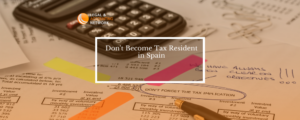What is the “Registro de la Propiedad” (Spanish Land Registry) and what is its purpose?
The Land Registry is an official registry where the real estate, real rights and tax burdens that weigh on them are recorded.
The Land Registry office belongs to the Ministry of Justice, and the Intellectual Property Registry is within the organization chart of the Ministry of Culture.
When buying or selling a property in Spain, you will need to sign a deed of purchase or sales at a public notary. The title deed should then be registered at the Land Registry office of the province where the property is situated to legally be coming into force although it’s not mandatory and it has a cost.
The function of the Land Registry office is to officially register any transactions, inscriptions and annotations, favouring the security and protection of real estate legal traffic.
Any acts affecting ownership or rights over real estate property, public or private, are to be inscribed in the Land Registry office.
Real Estate is identified in the Land Registry Offices of Spain, by means of the name of the Municipality, the Land Registry Office and Registry Section and the Land Registry Property Number
You can also register ownership of intellectual property, computer programmes, literary work, register a trade mark, domains .com, .net, or associations etc
If it’s not mandatory and has a cost, why should I have my house registered in the Spanish Land Registry?
The answer is clear: for legal guarantees, to avoid the many bureaucratic risks that can haunt a property. This procedure, which is not mandatory by law and has a cost, gives legal guarantees to the new buyer in the case of possible future problems. It serves, for example, to avoid the seizure for debts of the previous owner, or the impossibility to sell the property later without the previous owner’s consent and also to facilitate an inheritance.
What happens if your title deed is not registered at the land registry office?
If you bought or sold a property and signed this act at a public notary but the deed is not registered at the land registry office afterwards, the property will still appear with the former owner’s name in the files. All taxes issued would also be in the former holder’s name for example.
What is it that the Land and property Registry office records?
The Land and property Registry office registers the status of property ownership and encumbrances, cancellations of mortgages that affects a property, and also the copies of Statutes of Community Owners.
Why do I have to inform the Land Registry of the cancellation of a mortgage and who pays the costs of the cancellation?
When you economically cancel your mortgage loan with the bank but never inform the Land Registry, the property will still have the mortgage registered against it. In the case you would like to sell your property, the buyer’s lawyer will surely discover that there is a mortgage against the property and the buyer would most probably reject the sale.
The banks charge a penalty for the cancelling of a mortgage and it is normally when you sign the mortgage deeds that you agree the charges and expenses connected with a future cancellation. It’s also important to bear in mind that when you cancel a mortgage you will also have to pay the cancellation deeds at the Spanish Notary and additionally also the cost of the registration at the Land Registry.
What certificates, documents or information can you get from the Land and property Registry office?
There are several important documents and information that you can apply for at the registry office as long as you can prove that you are in fact the owner of the property, or if you have a power of attorney to do so, as for example:
- Nota Simple – (an official Certificate of property ownership)
- Certificación Registral
- Nota de localización – (informs about where a person has got properties or copyrights inscribed)
What is a Nota Simple/ Simple Note? One of the most important documents to obtain from the Land Registry
A Nota Simple is an informative resumed document that contains the identification of a real estate with its specific reference number called “the Unique Registry Code” (CRU), the identity of the holder(s) names and their ID and information of the rights registered over it – freehold, mortgage, usufruct… – and their extent, nature and limitations. It also contains the dates of the transactions. Any prohibitions or restrictions affecting the owners or the registered rights shall also be stated in this document.
What do I need in order to apply for the Nota Simple of a property?
In order to apply for a Nota simple you need to have at least some of the following information:
- The name of the owner/holder of the real estate or right
- Corporate name of the entity owning the property or right if that is the case.
- “the Unique real estate Registry identifyer Code” “Código Registral Único de la finca” (CRU), formerly called: IDUFIR, which stands for: Identificador Único de Finca Registral
- The Registered number of the property “número de la finca registral”.
- Cadastral Number of the plot
- ID number, passport number and NIE number of the holder
- Official Address
It must be taken into account that the registration indexes are inscribed either by CRU number of registered property or by owner, so it is recommended that users provide all the data they have so that the request made is not denied (due to lack of sufficient data for the location of the property) or negative (due to non-coincidence with the owner).
Other requirements:
To be able to confirm the application, due to data protection law, you will need to fill in why you have special interest in receiving the information of this particular property. The reason will be official and the owner is entitled to know who has asked for this information about his property.
Does the issuance of the document have a cost?
Yes, there is a small cost involved that can be paid through direct debit during the procedure.
Can I apply for a Nota simple online?
It is possible to apply for a Nota simple online. The easiest way is to use a Digital Certificate of a lawyer or a collaborating agent who is subscribed to this service, but it’s also possible without being registered. Nevertheless, if you only have the owners name and ID numbers to find the property, then it’s indispensable to use a digital certificate.
How do I receive the Nota simple?
The Nota simple will be issued and sent as a link to the email address given during the process. Following that link you can download the Nota Simple document in PDF form.
Would it be possible to get the Nota simple in English?
Yes, it is possible to get the Nota Simple in English translated by official translators who are used to the legal terms used in this field. This service has to be applied for separately, and has an extra cost of more or less 30 euros
What is a “Certificación Registral” and why do I need it?
The registry certification is a document issued by the Land Registry Office in Spain that shows weather or not the property has charges levied against it. This certificate is ideal if you for some reason need to know if there are debts on a property. The Nota Simple also provides you with this information but the registration certification has legal validity.
The registration certification can be of two types:
Domain certification; this type includes only data on the last domain ownership of the property in force at the time of your request.
Certification of domain and charges; this type of certification includes in addition to the previous data, the current charges and encumbrances that weigh on the property, such as embargoes, mortgages or pending lawsuits.
What is the difference between a Nota simple and a Registry Certification?
Both documents include the most relevant information on the legal situation of a property or right. They include identification and description, they inform about the true owner or the holder of the right in question, and also whether or not it has mortgages or seizures. The Nota Simple and the Registry Certification can both be obtained from the Land Registry office in the district in which the property is located.
The requirements to obtain either document is similar and the person requesting the information must express the legitimate interest he/she has (if he/she is not the owner of the right), as the registry entries are protected by the Data Protection Law.
The difference between the two is that the Nota Simple is purely informative, that is, it serves to make the applicant aware of the basic content of the Registry, but only with respect to holders, rights and charges in force at the time of the application. It is not possible to give information in the Nota Simple about old holders or rights that are already cancelled.
The Registry Certification, is a public document that is signed by the Registrar, which certifies the information recorded and that serves to prove the content that appears in the registry. If it is requested, in a Registry Certification you can be informed about both current and former holders, and current and extinguished rights.
*This document serves to assert and prove rights against third parties, physical, legal, courts and institutions and public bodies and is, legally, the only mean to do so.
However, given the trust that is given to any document issued by the Registry, for simple and day-to-day operations the “Simple note” is usually admitted to prove the ownership of a property or its economic situation, being commonly accepted even by banks for the study prior to the granting of mortgage loans etc.
What is a “Nota de localización”/ Location Note?
The Nota de Localización informs about where a certain natural or legal person has registered assets or rights inscribed. It’s an informative documentation. Registrations related to properties are obtained through the General Computerized Index of properties and provided through a Registrar. The Nota de Localización includes the domain and also all right that can be registered in a person’s favour, whatever their nature.
How do you apply for a Location note?
To apply for a Location Note, it’s indispensable to use a Digital certificate







